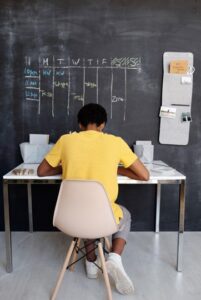Tips for the festive season
The festive season can be a really stressful period for autistic children and/or people who experience sensory processing difficulties. There are social/family gatherings, shopping in malls, bright and/or flashing lights, loud crowded spaces and changes in routine. In this article we will explain ways to make this time a little bit easier for your children. Autistic children may have difficulty engaging in typical holiday activities and can become overwhelmed by the hustle and bustle of the season. However, with a little extra planning and preparation, you can create a fun and enjoyable holiday season for your child.
Planning ahead
Planning ahead of time before outings and family gatherings can help reduce anxiety and stress for autistic children. Also planning to do something your child really enjoys after the outing may be a positive way to approach the activity. Here are some other ways to help prepare your child ahead of time:
- Use visual schedules: Create specific holiday visual schedules as they can be very helpful in providing a clear and concrete representation of the activities or tasks that are expected. These can be created using pictures, words, or a combination of both. It may also help with anxiety caused by the change in the day to day routine. You can be creative and include your child’s interests in the schedule, have fun with it 🙂
- Provide clear and concise instructions: Autistic children may have difficulty processing and following verbal instructions. Providing clear and concise instructions, using visual aids if necessary, can help them understand and follow through with tasks.
- Use social stories: Social stories are short, simple narratives that describe a specific situation or activity in a way that is visually stimulating and helps with processing the information. They can also be used to teach social skills, and routines.
- Use sensory strategies: as mentioned above autistic children may be sensitive to certain stimuli, such as loud noises or bright lights. Using sensory strategies, such as earplugs or sunglasses, can help them process and deal with these stimuli to help them feel calmer and engage in activities. Make sure to have your sensory tool kit with you when going on outings over this period.

Creating a calming space
Another way to support autistic children during the holidays is to provide them with a quiet and calming space where they can retreat if they become overwhelmed. This could be a dedicated room in your home or a quiet corner with comfortable seating and a few toys or books. This space should be free from distractions and loud noises, and should be a place where your child can relax and unwind.
If you are going to a family member’s house, be sure to establish that space ahead of time and explain to your child that it is the safe space they can go to if they need or alternatively, help your child go to the space if necessary. If you are in public, make sure you have a sensory kit in the car or on you in case you may need it. You can also ask your child where they would feel happier: outside, in the car, in a bathroom, wherever is practical for the public space in which you are in.
For information regarding how to create sensory toolkits or sensory friendly environments, please visit our courses.

Sensory-friendly activities
Another way to help your autistic child during the holidays is to focus on activities that are sensory-friendly. Try to choose activities that are not too stimulating, and avoid those that are likely to trigger a sensory overload. For example, instead of going to a crowded mall to see Santa Claus, consider visiting a local park or nature reserve where your child can enjoy the outdoors in a peaceful setting.
You can also involve your child in the holiday preparations by encouraging them to help with tasks, such as decorating the Christmas tree or wrapping presents or other chores around the house. This can be a fun and rewarding activity for your child, and can also help them to feel included and valued. Just be sure to provide clear instructions and break down the tasks into small, manageable steps to avoid overwhelming your child.
For over-stimulating activities that can not be avoided, as mentioned above, preparation is important, keep a sensory toolkit and plan to do something your child really enjoys afterwards.

See our blog on DIY sensory activities for autistic children that you can do this holiday season for fun activity ideas to try at home.
Being flexible
It is important to remember to be patient and flexible during the holiday season. Autistic children may have difficulty adapting to changes in routine, and may struggle with the additional stress and excitement of the holidays. Be prepared to adjust your plans and activities as needed to ensure that your child is happy and comfortable.
Communicating changes in advance
If there are changes in the plans or the established holiday routine, it is imperative to communicate this to your child in advance. Sudden changes in plans are quite stressful for autistic children, so explaining and giving them time to process as well as preparing them for what is to come is very important. You can use the above mentioned strategies to do so such as visual schedules or social stories.
Help your autistic child reach their full potential with our online course for parents that teaches you practical approaches for creating a home program! Discover the power of everyday moments to create meaningful change.
In conclusion, supporting autistic children during the holidays can be a challenge, but with a little extra planning and preparation, you can create a fun and enjoyable season for your child. By providing a quiet and calming space, focusing on sensory-friendly activities, involving your child in the holiday preparations, and being patient and flexible, you can help your child to have a happy and stress-free holiday season.
